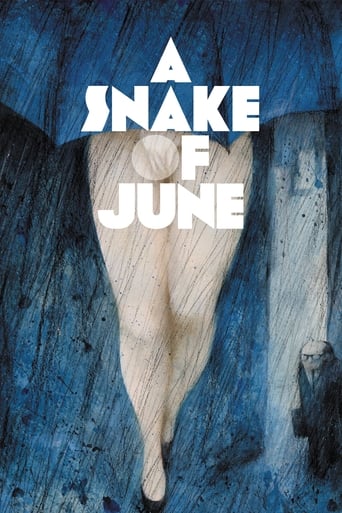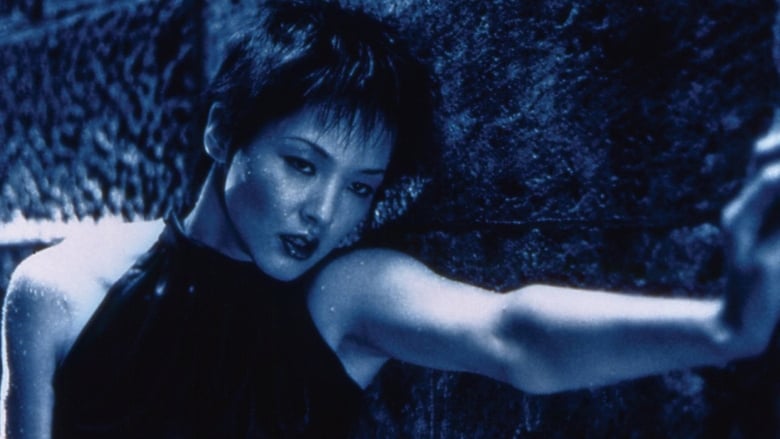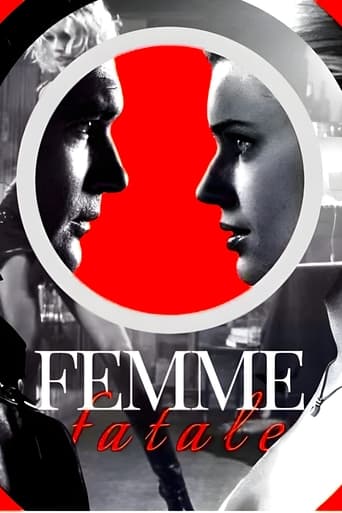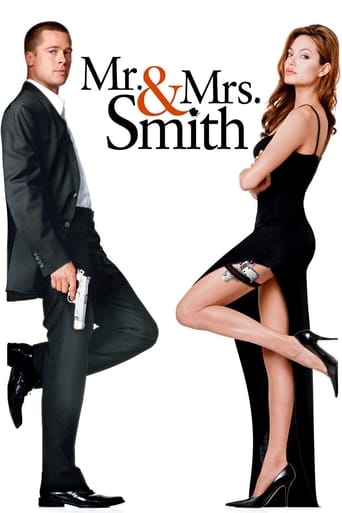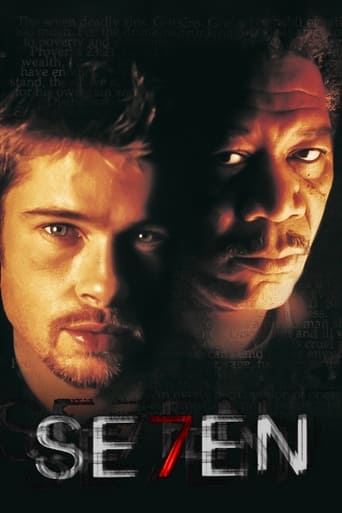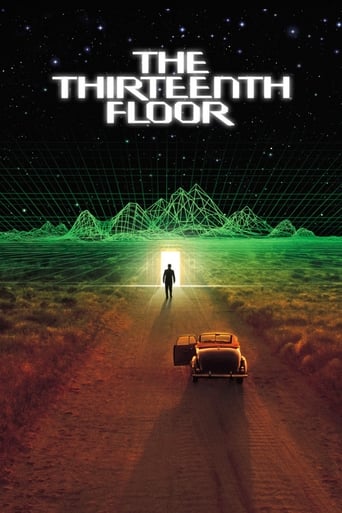A Snake of June (2003)
A woman is being stalked by a stranger. His stalking turns to blackmail when he sends her copies of photos of her in an embarrassing position. Now he controls her and she has to do anything he says. Anything.
Watch Trailer
Cast


Similar titles
Reviews
This Movie Can Only Be Described With One Word.
recommended
Just so...so bad
Blending excellent reporting and strong storytelling, this is a disturbing film truly stranger than fiction
Rinko (sexy Asuka Kurosawa) works as a telephone counsellor at a mental health centre, giving life-affirming advice to the depressed and suicidal; ironically, her own life could do with a bit of a shake up, a matter addressed when a stranger blackmails her into living out her private fantasies in public (which include walking through the streets in a mini-skirt sans underwear, purchasing a vibrator from a sex shop, and stripping completely naked in an alleyway during a torrential downpour).For a while, I reckoned I'd got the gist of A Snake of June, believing that director Shinya Tsukamoto was telling his audience that life is for the living, and that people shouldn't allow their inhibitions to stop them from doing what they enjoy; however, once Rinko's husband had been drugged, abducted and, along with a roomful of other men in a similar predicament, forced to watch through the funnel strapped to his face as a pair of women are first screwed and then drowned, I began to doubt my original assessment. From that point on I abandoned trying to figure out the director's intent (to avoid brain-ache) and settled for enjoying the rest of the film on a purely superficial level—for the pervy erotic content and the stylish monochromatic cinematography, both of which there are plenty.Although it wasn't nearly as exploitative as it could have been given the subject matter, and despite not actually understanding much (or all) of it, I found A Snake of June to be a surprisingly compelling piece of experimental cinema, intriguing in the first half, downright bizarre for the remainder, and nearly always visually interesting. It certainly isn't a film I would recommend to casual viewers of Asian cinema, but if you have a real love of surreal art-house flicks—the kind of whacked-out weirdness that throws in such seemingly random oddities as a prehensile metal penis and gratuitous snail imagery—then this should be right up your rain-soaked alley.6.5 out of 10, rounded up to 7 for the alleyway scene—wowzer!
A Snake of June (2002) is the thematic culmination of over a decade's worth of cinematic experimentation for Japanese auteur and erstwhile infant terrible Shinya Tsukamoto; with the film's themes of fear, repression and the limitations and fragility of the human body recalling the surrealist body-mutilation of Tetsuo: The Iron Man (1988) - and his metaphoric metamorphosis into a drill-bit wielding cyber-punk - through to the modern day horror of Tokyo Fist (1995) - with its punishing images of primal carnage - and of course, Bullet Ballet (1998) - with its wasteland of urban decay and the bleak thematic examination of suicide.With this in mind, viewing Tsukamoto's work from the visceral and vivid 'Tetsuo' through to the film in question is often like studying the basics of the auteur theory in seven easy steps; with the director progressing from the low-budget horror of The Iron Man (1988), through to it's bigger-budgeted sequel/remake Tetsuo II: Body Hammer (1991) and then onto the aforementioned double-punch of Tokyo Fist (1995) and Bullet Ballet (1998). That's not to mention his lush period-mystery Gemini (1999) and his more recent examination of death and decay with the subtle and mature Vital (2004). Each of these films presents its own treatise on a clearly defined theme, which, when viewed within the larger context of Tsukamoto's world presents us with a true, single-minded and intensely unique body of work. This is represented, not only by the repeated use of death, decay, metamorphosis and the human body as a central motif, but also by the presence of Tsukamoto as writer, director, cinematographer, editor, production designer and, in many cases, lead actor; but also with the vital role in which Tokyo itself plays in shaping his highly expressive narratives.In the Tetsuo films, Tokyo presented itself as a labyrinthine maze of metal, concrete and steel that only succeeded in dehumanising its citizens into soulless, destructive monsters; in Tokyo Fist, the skyline of the city dwarfs its central character, intensifying his sense of weakness and lack of power, and eventually leading to his attempt to reclaim himself from this backdrop of mocking malaise and social conformity; while in Bullet Ballet, the world is dark, empty, devoid of colour and numbed to any real sense of feeling and purpose. Once again, A Snake of June feels like a culmination of this idea; depicting a Tokyo that is cold, claustrophobic, awash with a constant rain and a general lack of warm colour; with the images here presented in a blue-tinted monochrome that stresses the empty sterility of the central relationship and the world in which they inhabit.Like The Iron Man, Body Hammer, Tokyo Fist and Gemini, the film uses the relationship between three characters (and their feelings of jealously, lust and paranoia) as its starting point; introducing us to Rinko (Asuka Kurosawa) and her husband Shigehiko (Yuji Koutari), who live a contented, if entirely soulless existence lost amongst the high-rise apartments of metropolitan Tokyo. All of this is turned upside down however by the appearance of Iguchi (Tsukamoto), a terminally ill photographer of lurid pornography who meets Rinko via her position as a Samaritans-like phone councillor, and, realising that she has helped him put the final stages of his life in order, decides that he wants to do the same for her. What follows is series of sensational mind-games, as Iguchi blackmails the prim Rinko with illicit, secret photos he's taken of her masturbating in her apartment in order to get her to act out the sordid, self-pleasuring acts she furtively craves. For example, in one of the film's central set-pieces, Iguchi, using a cell phone, instructs Rinko to buy a scandalously short-skirt, to wear it in a crowded shopping mall without underwear, to buy a vibrator, to insert it and then, finally, to buy a series of embarrassingly phallic objects from a local fruit vendor while he controls the vibrator via remote control.The second half of the film is more fragmented and surreal; moving into the expressive, metaphorical, highly visual realm of Tetsuo and Tokyo Fist; as Shigehiko's repressed businessman is literally terrorised by his own deeply-hidden desires, while Iguchi's physical pain and torment are manifested in blood-soaked violence and an extendable, metallic phallus that emerges from a hole in his stomach. I wouldn't want to give too much away, but these scenes definitely need to be experienced, not only as they represent for me what true film-making really is, but also because they present the central emotional construct of these characters better than any dialog or exposition ever could! The film has a few more twists and turns that I won't go into here, though, sufficed to say, the overall message of the film is ultimately a simple one, though it's told in a highly expressive and enigmatic manner that is more than suited to Tsukamoto's wild and distinctive cinematic imagination.The performances from all three of the lead actors are outstanding and much deeper and more emotionally honest than you might-expect from a low-budget Japanese art film; though, it has to be said, it's really Tsukamoto, both as a filmmaker and with his complex performance as Iguchi and Asuka Kurosawa's fearless performance as Rinko that truly dominate. A Snake of June is, for me, what cinema should be; complex, visually stunning, intelligent, enigmatic, emotionally charged and above all else, challenging. It obviously won't be to all tastes, but certainly those with a fondness for challenging independent cinema and an open mind will find much to appreciate; whilst those who are already familiar with Tsukamoto's previous work, such as Bullet Ballet or his earlier masterpiece Tokyo Fist, should easily find much to enjoy within the rain-soaked claustrophobia of A Snake of June's very bizarre love triangle.
This movie has some very interesting imagery. And that's where it ends. The plot is one only a schoolboy that huffs gasoline and snorts glue would be able to imagine- twisted yet very very dumb and retarded with the story's development.After a while we are just sitting there watching pointless scenes which are very similar to the development of "phone booth"- a character being continually tortured by the demands of an invisible sadist. If you are pathetic enough to have a fetish for watching slim Japanese women being tortured then this is your movie. There is a prevalent attitude in a lot of Japanese cinema of making scenes that show people being tortured but secretly loving it and having the experience make them get off sexually. The message here is that deep down inside, this chick wanted this treatment and she enjoyed it so she deserved it. That's just cro-magnon sex-offender thinking, and as such this movie is especially stupid because it really wallows in degrading the woman in a sexual manner. The man writing this crap is sexually insecure for very good reasons apparently. This movie is the fetish of all rapists- she is being tortured but in reality she loves it because it gives her a break from her boring marriage. Creepy. Turn the sound off when you watch this and it will just be interesting imagery and no creepy conversations between sadist and victim.
Having read the review of Chris-123, I almost skipped this movie expecting something like "Monster" or "Irreversible". None of his references rang a bell so, hopefully, they give a better they give a better impression of Snake of June. Fortunately, my curiosity took over and I went ahead seeing the movie... It crackles with tension -between and within each of the three Characters. Although much of this tension is based on unfulfilled sexual desires, it does not go beyond showing flesh as in most current Hollywood mass productions. Neither did I find it repulsive or threatening. You will get involved with this movie, with the portrayed characters, with the acting, the scenes and, indeed, the rain. Although the blackmailing at start seems to be very humiliating and inhumane, it seems to fix the marriage of the victim in the end. Drastic means, no doubt but on a far lower scale than what I had expected.Go ahead, watch it. It will make you think.

